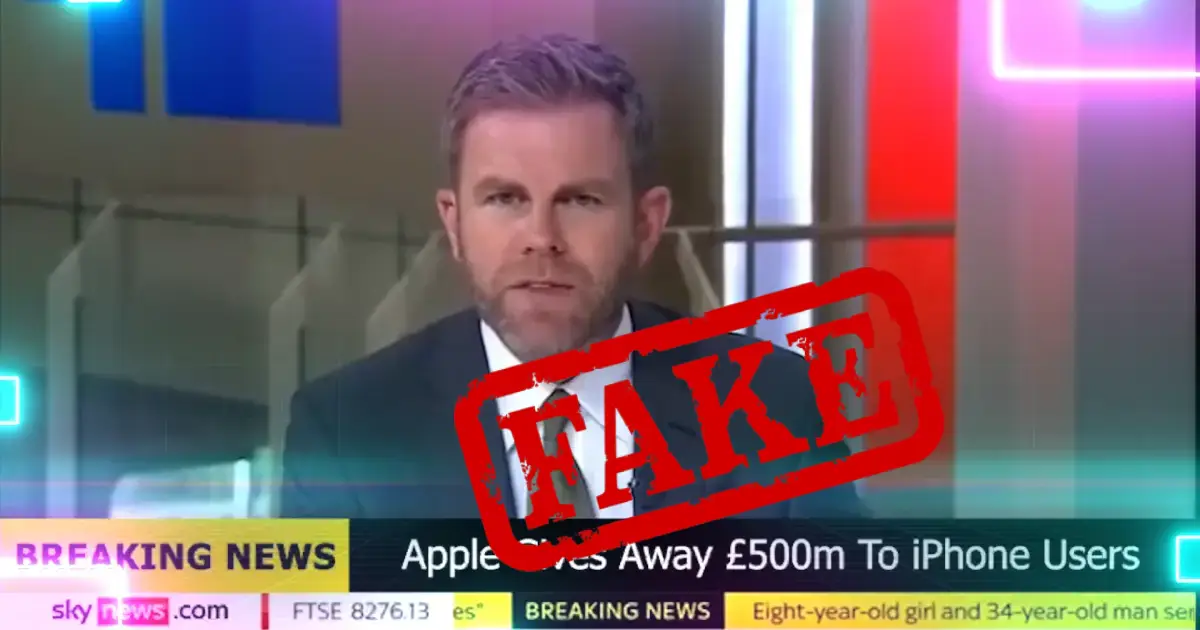Deepfakes: journalists tricked into promoting scams
Journalists from Sky News have fallen victim to deepfakes used to promote illegal online casinos, hidden behind applications presented as games for children on the App Store. Once downloaded, these applications redirect users to unauthorised gambling sites, putting their personal and financial data at risk. Corporate identities have also been stolen to legitimise these scams.
In an ever-evolving digital world, where artificial intelligence pushes the boundaries of what is real every day, a disturbing case reveals the extent to which these advances can be hijacked for malicious purposes. Sky News journalists recently discovered that they had been ‘deepfaked’ – their faces and voices cleverly falsified using synthetic technologies – to promote illegal online casinos without their knowledge. Spread across social networks and via applications disguised as games for children on the App Store, these fraudulent advertisements illustrate the excesses of a digital ecosystem that is increasingly difficult to regulate.
A new kind of digital scam
Sky News journalists discovered that they had been the victims of deepfakes implicating them in the promotion of illegal online casinos. The faked videos showed them promoting gambling applications hidden in the App Store, even though they had never been involved in any such promotions.
The offending apps, such as ‘Limbo Hopper Frog’, were carefully disguised to fool the platforms’ verification systems and users. Featuring colourful visuals, cute animals as characters and a categorisation indicating that they were suitable for children aged 4 and over, they gave no indication of their true nature. Once downloaded, they redirect users to unauthorised online casinos. These applications used sophisticated techniques to bypass the platforms’ security controls, in particular by modifying their content after approval.
A threat to consumers and online security
The scammers behind these apps have also impersonated small businesses to make their products appear legitimate. Carla, a marketing consultant based in Wales, discovered that her name was associated with a casino app without her consent. Similarly, Jennifer Viccars, co-founder of the MyUnit platform, saw her company listed as the developer of another fraudulent app.
‘This is the antithesis of the brand values of the space we occupy. We’re about making sure that the people who have the least aren’t exploited.’
According to Andrew Rhodes, chief executive of the Gambling Commission, these illegal casinos are not just breaking gambling laws. They are also putting consumers at risk by stealing their financial data and exposing them to the risk of fraud.
‘You don’t know where your money is being held, where your financial details have gone. You are vulnerable to something bad happening to you. [These casinos] are illegal for a reason.’
Users have reported being asked to provide credit card photos, ID and utility bills to withdraw their winnings, raising serious data protection concerns.
‘It will be used for money laundering, identity theft and simply to make money,’ says Rhodes.
Technology platforms under pressure
Although Apple claims to detect tens of thousands of fraudulent applications every year, this case highlights the flaws in its verification processes. Fraudulent apps have managed to get through the checks by posing as innocent games, before altering their content to redirect users to illegal casinos.
Rhodes called on platforms to step up their security measures:
‘If you are presenting something to consumers, you’ve got an obligation to make sure it is what it says.’
A response from the authorities, but continuing challenges
Since April last year, the Gambling Commission’s enforcement team has issued more than 1,150 cease and desist notices, and more than 81,000 URLs have been removed from search engines at their request. However, the evolving nature of these scams, combined with the use of advanced technologies such as deepfakes, makes the fight against these illegal activities particularly complex.
Many stars fall victim to advertising deepfakes
The case of the Sky News journalists is not an isolated one. For several months, celebrities have been targeted by deepfake campaigns implicating them in illegal online casino promotions.
Fake videos using excerpts from Dutch news programmes, such as NOS and Omroep Brabant, have been broadcast to promote illegal online gambling sites.
Several football stars have recently fallen victim to deepfakes used to illegally promote online casinos. Virgil van Dijk, captain of the Dutch national team, had his image hijacked in a fake video posted on Instagram, showing him falsely recommending a gambling application. Belgian international Kevin De Bruyne was unwittingly involved in a fraudulent Facebook video in which his AI-generated image and voice were used to promote an online casino.
These manipulations were aimed at giving an appearance of legitimacy to these fraudulent platforms. These examples illustrate the ease with which advanced technologies can be used to mislead the public and promote illegal activities.


